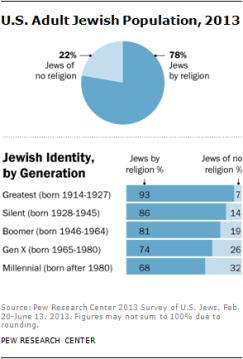
The report found a changing Jewish identity in America, with one in five Jews (22 percent) describing themselves as having no religion.
The finding isn’t surprising to Rabbi Elizabeth Goldstein, assistant professor of religious studies at Gonzaga University, who said she’s seen many adherents look outside Judaism to find spiritual nourishment. Particularly, she said, when Jews don’t live in communities where they have easy access to Hebrew education.
The statistic that two-thirds of secular Jews aren’t raising their children Jewish was a little more disturbing to Goldstein.
“There was a time when people in previous generations might not feel connected to it (the Jewish faith), but would have still felt that obligation. They wouldn’t have not given their children a Jewish education,” she said.
The Pew Research study also found an increase in interfaith marriage among Jews. Since 2005, nearly six-in-ten Jews have married a non-Jewish spouse.
Reform Judaism is the largest denominational affiliation, with 35 percent of all U.S. Jews identifying with the movement. Jews of no denomination make up 30 percent and 18 percent of Jews identify as being Conservative. Orthodox Jews make up 10 percent of the Jewish population.
“The retention rate for the Orthodox is less than 50 percent,” said Pew Research Deputy Director Alan Cooperman in a presentation to religion reporters in Austin.
However, the study shows that Orthodox Jews tend to have larger families, which means their share of the Jewish population will likely grow.
The study also revealed that 30 percent of U.S. Jews feel very attached and 39 percent feel somewhat attached to Israel. Less than half of American Jews, 43 percent, have traveled to Israel. 40 percent said they believe God gave Israel to the Jewish people.
“The percentage of Christians who say that is higher,” Cooperman pointed out.
When asked what it means to be Jewish in America today, 43 percent of Jews said caring about Israel. The majority, 73 percent, said remembering the Holocaust and 42 percent said having a good sense of humor.
Goldstein said those findings weren’t startling, but was surprised that 34 percent of Jews said one can still be Jewish if he or she believes Jesus was the messiah.
“I feel like that’s a line in the sand,” she said. “For me that’s the delineation when it comes to Jews and Christians. It’s their right to self-identify, but for me it’s a theological difference.”
Another survey discovery was that Jews tend to think other minority groups face more discrimination than they do. About 72 percent says gays, lesbians and Muslims are discriminated against more than Jews, and 64 percent say blacks are discriminated against more.
Goldstein said in Spokane she doesn’t feel discriminated against for being Jewish, but feels people don’t understand the Jewish culture.
“I don’t think people even understand what Jews are, what Jews believe; there’s so much ignorance because Jews are such a small percentage of the population (here),” she said.
Nationally Jews make up about 2 percent of the population, according to the survey.
The full survey and its findings can be found here.






